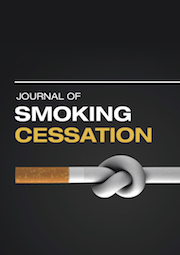Crossref Citations
This article has been cited by the following publications. This list is generated based on data provided by
Crossref.
Bottorff, Joan L.
Haines-Saah, Rebecca
Oliffe, John L.
and
Sarbit, Gayl
2012.
Gender Influences in Tobacco Use and Cessation Interventions.
Nursing Clinics of North America,
Vol. 47,
Issue. 1,
p.
55.
Pulvers, Kim
Hood, Anna
Limas, Eleuterio F.
and
Thomas, Marie D.
2012.
Female smokers show lower pain tolerance in a physical distress task.
Addictive Behaviors,
Vol. 37,
Issue. 10,
p.
1167.
Salameh, Pascale
Khayat, Georges
and
Waked, Mirna
2012.
Lower Prevalence of Cigarette and Waterpipe Smoking, But a Higher Risk of Waterpipe Dependence in Lebanese Adult Women Than in Men.
Women & Health,
Vol. 52,
Issue. 2,
p.
135.
Torchalla, Iris
Okoli, Chizimuzo T. C.
Bottorff, Joan L.
Qu, Annie
Poole, Nancy
and
Greaves, Lorraine
2012.
Smoking Cessation Programs Targeted to Women: A Systematic Review.
Women & Health,
Vol. 52,
Issue. 1,
p.
32.
Rosenthal, Lisa
Carroll-Scott, Amy
Earnshaw, Valerie A.
Sackey, Naa
O'Malley, Stephanie S.
Santilli, Alycia
and
Ickovics, Jeannette R.
2013.
Targeting cessation: Understanding barriers and motivations to quitting among urban adult daily tobacco smokers.
Addictive Behaviors,
Vol. 38,
Issue. 3,
p.
1639.
Bottorff, Joan L
Haines-Saah, Rebecca
Kelly, Mary T
Oliffe, John L
Torchalla, Iris
Poole, Nancy
Greaves, Lorraine
Robinson, Carole A
Ensom, Mary HH
Okoli, Chizimuzo TC
and
Phillips, J Craig
2014.
Gender, smoking and tobacco reduction and cessation: a scoping review.
International Journal for Equity in Health,
Vol. 13,
Issue. 1,
Matcham, Faith
McNally, Lisa
and
Vogt, Florian
2014.
A pilot randomized controlled trial to increase smoking cessation by maintaining National Health Service Stop Smoking Service attendance.
British Journal of Health Psychology,
Vol. 19,
Issue. 4,
p.
795.
Donley, Euan R.
2014.
Managing Risk of Difficult Behaviors in the Hospital Emergency Department: The Use of Cigarette Breaks With Mental Health Patients.
Social Work in Mental Health,
Vol. 12,
Issue. 1,
p.
36.
Walitzer, Kimberly S.
Dearing, Ronda L.
Barrick, Christopher
and
Shyhalla, Kathleen
2015.
Tobacco Smoking Among Male and Female Alcohol Treatment-seekers: Clinical Complexities, Treatment Length of Stay, and Goal Achievement.
Substance Use & Misuse,
Vol. 50,
Issue. 2,
p.
166.
Chen, Danhong
and
Wu, Li-Tzy
2015.
Smoking cessation interventions for adults aged 50 or older: A systematic review and meta-analysis.
Drug and Alcohol Dependence,
Vol. 154,
Issue. ,
p.
14.
Wray, J. M.
Gray, K. M.
McClure, E. A.
Carpenter, M. J.
Tiffany, S. T.
and
Saladin, M. E.
2015.
Gender Differences in Responses to Cues Presented in the Natural Environment of Cigarette Smokers.
Nicotine & Tobacco Research,
Vol. 17,
Issue. 4,
p.
438.
Bottorff, Joan
Robinson, Carole
Sarbit, Gayle
Graham,
Raquel
Kelly, Mary
and
Torchalla, Iris
2015.
A Motivational, Gender-Sensitive Smoking Cessation Resource for Family Members of Patients
With Lung Cancer.
Oncology Nursing Forum,
Vol. 42,
Issue. 4,
p.
363.
Robinson, Jason D
Versace, Francesco
Engelmann, Jeffery M
Cui, Yong
Gilbert, David G
Waters, Andrew J
Gritz, Ellen R
and
Cinciripini, Paul M
2016.
Attentional bias to smoking and other motivationally relevant cues is affected by nicotine exposure and dose expectancy.
Journal of Psychopharmacology,
Vol. 30,
Issue. 7,
p.
627.
Scott-Sheldon, Lori A. J
Lantini, Ryan
Jennings, Ernestine G
Thind, Herpreet
Rosen, Rochelle K
Salmoirago-Blotcher, Elena
and
Bock, Beth C
2016.
Text Messaging-Based Interventions for Smoking Cessation: A Systematic Review and Meta-Analysis.
JMIR mHealth and uHealth,
Vol. 4,
Issue. 2,
p.
e49.
Minian, Nadia
Penner, Jessica
Voci, Sabrina
and
Selby, Peter
2016.
Woman focused smoking cessation programming: a qualitative study.
BMC Women's Health,
Vol. 16,
Issue. 1,
Yang, Irene
and
Hall, Lynne A.
2017.
Nicotine Dependence Measures for Perinatal Women.
Clinical Nursing Research,
Vol. 26,
Issue. 4,
p.
419.
Lima Passos, Valéria
Crutzen, Rik
Feder, Johannes T.
Willemsen, Marc C.
Lemmens, Paul
and
Hummel, Karin
2019.
Dynamic, data-driven typologies of long-term smoking, cessation, and their correlates: Findings from the International Tobacco Control (ITC) Netherlands Survey.
Social Science & Medicine,
Vol. 235,
Issue. ,
p.
112393.
Jayakumar, Navitha
Chaiton, Michael
Zhang, Bo
Selby, Peter
and
Schwartz, Robert
2020.
Sex Differences in Use of Smoking Cessation Services and Resources: A Real-World Study.
Tobacco Use Insights,
Vol. 13,
Issue. ,
p.
1179173X2090150.
Youn, Jung Hee
and
Shin, Sujin
2021.
The experience of continued smoking after stroke in Korean males: A qualitative study.
Nursing Open,
Vol. 8,
Issue. 5,
p.
2750.
Choi, Seung Hee
2022.
A systematic review and narrative summary of couple-based smoking cessation interventions.
Journal of Social and Personal Relationships,
Vol. 39,
Issue. 7,
p.
1901.




